Whether you are camping or enjoying a little backyard entertaining around a fire pit, you can easily repel mosquitoes by tossing in a few herb branches. Burning herbs is a natural and safe way to keep mosquitoes from making you their next meal. Read on to find out which fresh plants and herbs repel mosquitoes and how to use them.
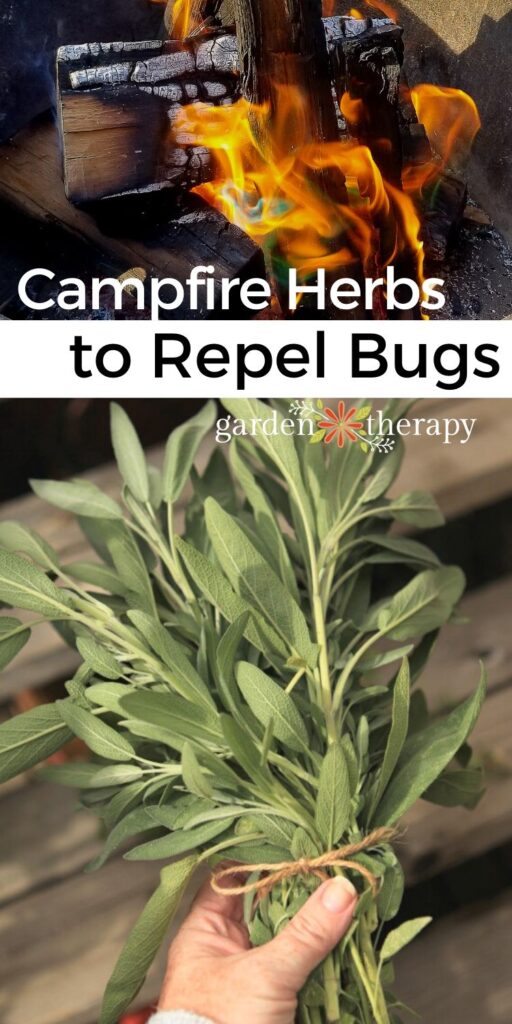
Spending time outside is one of my favorite things to do. I can garden practically all day and not be the least bit bothered by insects. Then, the evening comes, and the mosquitoes come out. UGH! My least favourite insect of them all!
Without any mosquito intervention, I become the meal du jour, and my lovely day turns into an evening of waving hands and smacking myself in an erratic and awkward dance to prevent the inevitable itchy welts that are sure to follow.
As I have learned more about plants over the years, one of the things I have discovered is methods for using plants to naturally repel mosquitoes.
This both allows me to appreciate the natural benefits of plants while also avoiding the use of potentially damaging chemicals in commercial bug sprays.
Over time, I developed my natural bug spray which is made with essential oils and has worked wonders when it’s mosquito season. Another method that I use to deter mosquitoes is burning branches of herbs over the fire pit (or campfire).
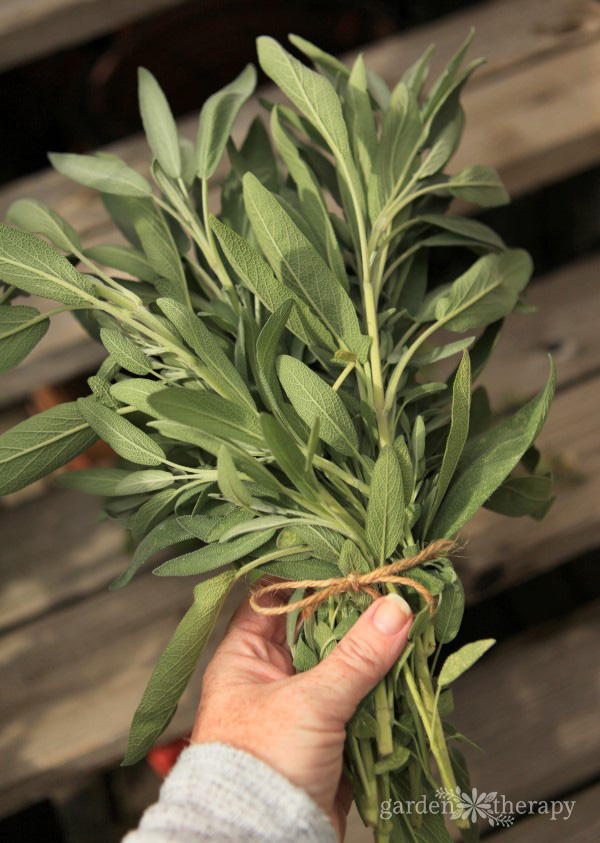
History of Burning Herbs
Indigenous Peoples, healers, herbalists, religious leaders, and the spiritually devoted from all over the world have burned herbs as a part of their religious and cultural traditions for centuries.
Indigenous Peoples sustainably harvest sacred plants native to the land with appreciating and reverence. Drying and bundling them, and burning them in a cleansing practice called smudging. Smudge sticks are used for ceremonial and purification purposes.
These practices are steeped with tradition and deep spiritual meaning. With all that has been taken from Indigenous Peoples, it’s essential for non-native folks to avoid culturally appropriating these rituals.
How to Burn Herbs With Appreciation For Other Cultures
In modern herbalism, so much of what we use today is based on the practices of many cultures. There is a deep appreciation for the history of using (and burning) herbs and allowing herbal studies to include both the past and the present.
Burning herbs over a fire for the herbal properties is a respectfully different practice than the use of smudge sticks for ceremonial or religious purposes. Smoke cleansing is the act of burning herbs without the cultural or spiritual, and is an enjoyable way to experience the beneficial herbal properties.
When I burn herbs over a fire to repel mosquitoes, I do so with appreciation and gratitude for both the ancient knowledge of herbs as well as the use of herbal plants (not sacred plants) to safely and effectively keep bugs at bay.
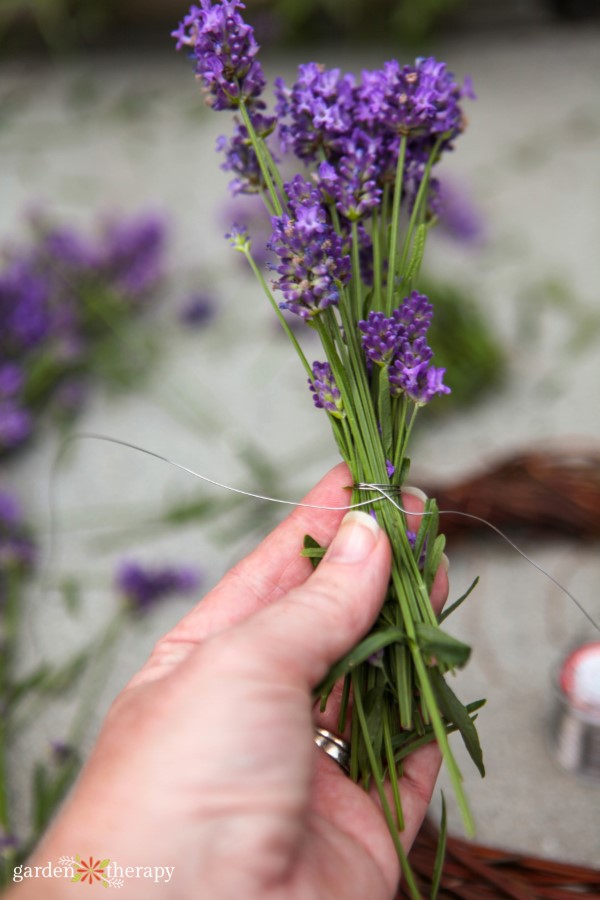
Which Plants Repel Mosquitoes?
To put it mildly, I hate getting mosquito bites. My immune system reacts very strongly to their saliva which means I end up with large, itchy, welt bites that bother me for days. I used to use large amounts of bug spray to save myself from mosquito bites, but the spray bothered me too.
Fortunately, there are natural ways to successfully deter those pesky bugs!
Mosquitoes hate strong-smelling herbs like:
- Lavender
- Mint
- Lemon balm
- Sage
- Citronella
We can use these herbs in several ways to help deliver the one-two punch that will keep pesky bugs away so we can enjoy evenings outside.
Another tool for your mosquito-repelling tool belt is to toss a few branches of herbs (fresh or dried) into the fire. Thankfully, what smells heavenly to you, will send bugs packing. Let’s dive a little deeper into each herb to find out why.
Lavender
Lavender has a well known – and widely used – pleasant scent that fortunately, people love and mosquitoes hate. Burning lavender is highly effective at repelling flying insects.
Fun fact: you can also rub the plant directly on your skin to release its oils as another way to tackle pest control.
Mint
Members of the mint family (peppermint, etc) all have a strong, pleasant smell that flying insects hate.
Lemon Balm
Lemon balm is part of the mint family that has pleasant white flowers and a mild lemony fragrance. It works well to keep mosquitoes away.
However, the potential downside to lemon balm is that it grows fast and can quickly take over your garden. It’s best to plant lemon balm in a container or other contained space to keep it from running wild.
Sage
Burning sage emits pleasant aromatherapy that makes an evening outside even better. The other benefit is that the same smell deters mosquitoes and other flying pests.
Citronella
One very well-known and common ingredient in mosquito-repelling candles is citronella. Its strong smell does a great job of masking the very aspects that attract mosquitoes to us. Fortunately for us, citronella is easy to grow.
Of course, just the smoke from the fire helps keep bugs away. But, by adding in some herbs that keep mosquitoes and biting insects away, they help to mask your smell. So, if you’re like me and seem to attract biting insects away from other people, the addition of herbs to your fire could likely be that extra step you need to REALLY keep the bugs away.
How to Repel Mosquitoes Without a Fire
Even if you don’t have a firepit, then you can still create bug-repelling smoke. Making your own citronella candles is easy and inexpensive if you use recycled materials. See how to make these Citronella Candles or these Terracotta Pot Citronella Candles to have throughout your garden.
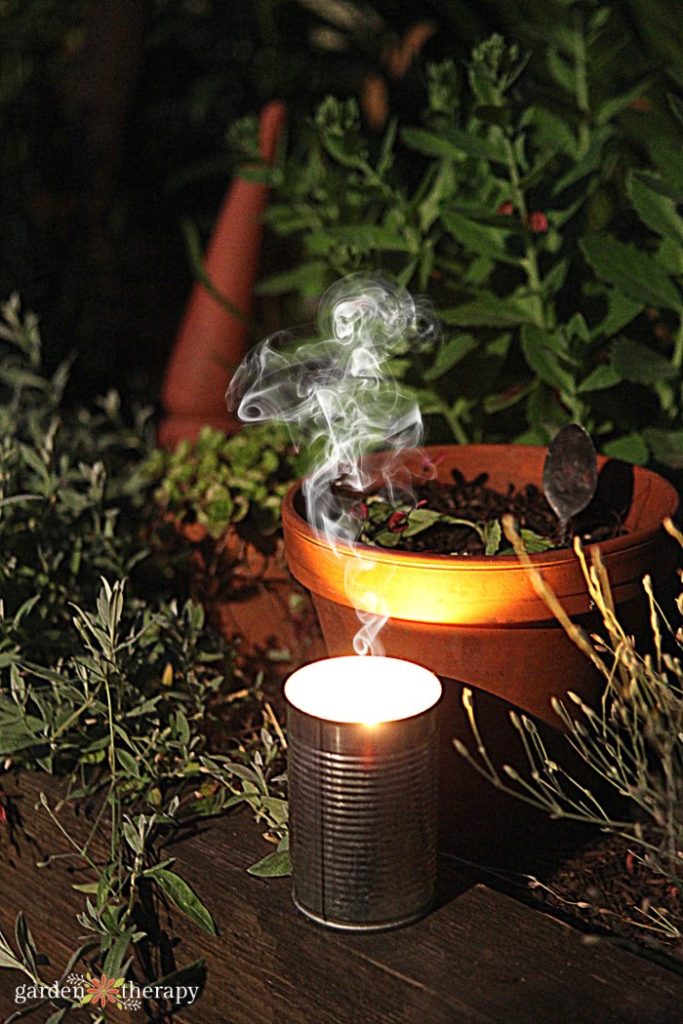
For an extra line of defense, don’t forget to spritz on this all-natural bug repellent that really works (and I would know, because even though I don’t love mosquitoes – they LOVE me)!
I’ve also been dabbling and planting a few mosquito-repelling container gardens to have around the areas I tend to frequently be in and I have to say, they have been helping tremendously.
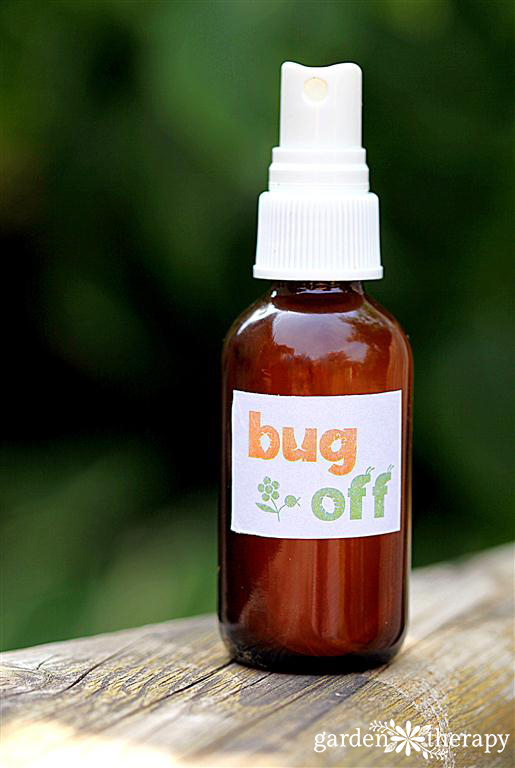
Between burning herb bundles, using my DIY bug spray, and DIY candles, you can finally (and safely) say “buzz off!” to pesky mosquitoes and get back to enjoying your evening outside.




Hi Stephanie!
My husband and I are arguing about whether the herbs have to be dried or not… Can you help us please? ;)
So for all this knowledge about what herbs and origin it doesn’t explain HOW to burn the herbs in the fire! Wrap in tinfoil wet?? Tinfoil is wet or herbs are wet? Poke holes in tinfoil and then put in fire??
Need explanation
Just toss them into the fire. easy paesy.